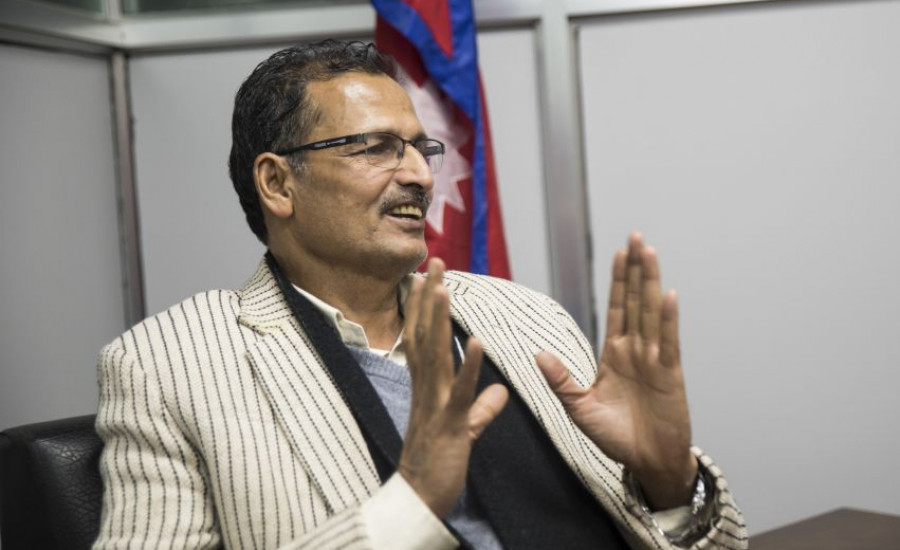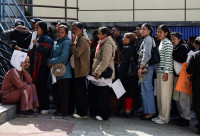National
Speaker sends back Constitutional Council’s recommendations
The Council, headed by prime minister, had appointed office-bearers to various constitutional bodies on December 15 after introducing an ordinance.
Tika R Pradhan
Speaker Agni Prasad Sapkota has returned the appointment recommendations made by the Constitutional Council on December 15 to the Secretariat of the Constitutional Council.
A meeting of the Constitutional Council, headed by Prime Minister KP Sharma Oli, had recommended 38 office-bearers for 11 constitutional bodies, including the Commission for Investigation of Abuse of Authority and the National Human Rights Commission.
According to a press statement issued by the Parliament Secretariat, the recommendations sent for parliamentary hearing have been returned to the Secretariat of the Constitutional Council because the meeting that made the recommendations was held without informing the Speaker.
“The Speaker has sent all the documents for conducting the parliamentary hearing to the Secretariat of the Constitutional Council as they were received on December 20, 2020 after a meeting of the Council of Ministers that morning decided to dissolve the House of Representatives,” reads the statement. “The House dissolution ended the term of the parliamentary hearing committee too. So there is no way those recommendations can be presented before the committee for a hearing”
Parliamentary hearing is a mandatory process required by the constitution for the appointments made by the Constitutional Council.
As per Article 292, parliamentary hearings shall be conducted for appointments in the offices of the chief justice and judges of the Supreme Court, members of the Judicial Council, chiefs and members of constitutional bodies and offices of ambassadors.
The Parliament Secretariat had received the Council decision to appoint office-bearers to 11 constitutional bodies 43 days ago.
As per Rule 26 (2) of the Joint Parliamentary Meeting Regulation, there would be no obstruction for the recommended people to assume office in constitutional bodies if the hearing committee fails to take any decision within 45 days of receiving the letter from the [Constitutional] Council.
The recommendations had run into controversy because they were made after Oli introduced an ordinance on the Constitutional Council Act-2010 (Function, Duties and Procedures) on December 15, amending two provisions which meant the council could convene a meeting if the majority of the existing members attend the meeting and take a decision on the basis of majority. A meeting of the council on the evening of December 15 had made the recommendations.
That meeting was not attended by Speaker Sapkota and leader of the main opposition Sher Bahadur Deuba.
Prime Minister Oli, Chief Justice Cholendra Shamsher Rana and National Assembly Chairman Ganesh Prasad Timilsina were present.
Article 284 of constitution stipulates a six-member Constitutional Council headed by prime minister.
The chief justice, Speaker, deputy Speaker, National Assembly chair and the leader of the main opposition are the members of the Council.
Clause 6 (3) of the Constitutional Council Act (Functions, Duties and Procedures) 2010 had it that at least five members must be present besides prime minister for the Council to convene its meeting. Similarly, Clause 6 (5) said that a decision must be taken based on consensus.
Since the deputy Speaker was yet to be elected, one member’s absence could stop the Constitutional Council from holding the meeting.
The new provisions introduced through the ordinance, however, meant that even the presence of just three members was enough to convene the meeting and decisions could be taken based on majority. After introducing the ordinance, the council, in the presence of Oli, Rana and Timilsina, had taken the decision.
Oli’s decision to introduce the ordinance had drawn severe criticism.
Experts on constitutional affairs had described Oli’s decision to issue the ordinance to amend the Constitutional Council Act as “a Machiavellian fraud” on the constitution and an action that undermined the principle of checks and balances.
Oli had introduced the ordinance when infighting in his Nepal Communist Party had reached a tipping point, with the faction led by Pushpa Kamal Dahal and Madhav Kumar Nepal demanding his resignation both as prime minister and party chair.
At the December 16 meeting of the Standing Committee meeting of the Nepal Communist Party, Oli agreed to withdraw the ordinance but later he refused to do so. It later turned out that he had already held a meeting of the Constitutional Council that appointed office-bearers to 11 constitutional bodies the same day he had introduced the ordinance that was swiftly approved by President Bidya Devi Bhandari.
The recommendation decision, however, had reached the Parliament Secretariat on December 20, the day Oli dissolved the House.
Oli’s House dissolution move resulted in a split in the Nepal Communist Party and the other faction is led by Pushpa Kamal Dahal and Madhav Kumar Nepal.
Speaker Sapkota is considered Dahal’s close ally.
Sapkota was elected Speaker in January last year in what was seen a victory for Dahal who had been at odds with Oli at the time as well.
As Oli-Dahal tussle intensified in the party, it had gradually become apparent that Sapkota would not cooperate with Oli.
Days before the ordinance on the Constitutional Council Act, Sapkota had skipped a couple of council meetings called by Prime Minister Oli in an action described by some as a tactical move taken at Dahal’s behest.
Without the presence of the Speaker or the leader of the main opposition, the meeting could not even convene, let alone take decisions. Oli had then introduced the ordinance to change the provisions for holding the meeting and taking decisions.
Insiders had told the Post then that Oli had for long seen Sapkota as an irritant and he had taken the Speaker’s refusal to attend the Constitutional Council meetings as an offence.
Those close to Oli had said he had no option than to introduce the ordinance as various constitutional bodies were without office-bearers and that he was not getting cooperation from the council members, including Sapkota.
But by changing the provisions for convening the meeting and taking decisions, Oli had disturbed the balance of the council, as the constitution envisioned the composition requiring the presence of the House Speaker and the leader of the opposition to ensure the checks and balances.
Many believe Oli introduced the ordinance so that he could appoint people of his choice to some constitutional bodies, including the Commission for Investigation of Abuse of Authority, so that he can keep his opponents in the party in check.
But now with the Speaker returning the recommendations saying that with the House dissolution, there is no parliamentary hearing committee, there is no clarity as to what happens next.
Some say Speaker’s decision to return the recommendations barely makes any difference and that those recommended for the positions will get automatic appointment as no hearing is possible within constitutionally mandated 45 days.
Returning such documents, however, is not a new practice, according to the Parliament Secretariat.
“In the past also, recommendations made for hearings when the parliamentary hearing committee was not in place have been returned,” reads the statement undersigned by Roj Nath Pandey, secretary of the Parliamentary Secretariat.
In the letter, Speaker Sapkota has been quoted as saying that he was using his inherent right to return those documents to the Secretariat of the Constitutional Council.
“It is my responsibility and duty to protect and promote the House as per Article 2 of the Constitution,” reads the statement. “Since the House has been dissolved, as a leader of that body, to protect the sovereignty of the people it is my responsibility to employ the inherent right that has been bestowed upon me.”




 20.9°C Kathmandu
20.9°C Kathmandu














